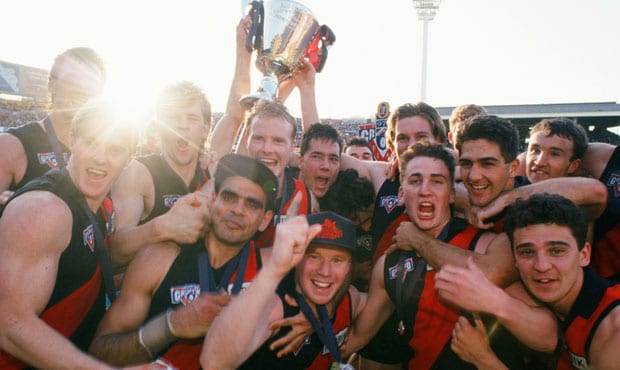Dan Eddy is the author of King Richard: The Story of Dick Reynolds, as well as Skills of Australian Football. He is the co-author of Champions: Conversations with Great Players & Coaches of Australian Football, and The Will to Fly. Eddy is a current PhD scholarship recipient (Federation University), whose project will examine the career of AFL Legend Alex Jesaulenko, and this article is an extract from his upcoming book, 'Always Striving': The Moments That Have Made the Essendon Football Club.
It was appropriate that in the very year of Michael Long’s enlightenment, in a season which he ran, – no, glided – weaved, bounced, tackled and roamed across football fields throughout the country, the world was celebrating the Year of Indigenous People. It was as if it was pre-destined: the more Essendon’s improbable rise up the ladder gained momentum, a stage was being set for one of the most thrilling individual showpieces imaginable. It was the stuff of dreams. No. It was Dreamtime.
The 1993 preliminary final was Long’s 101st game. A few weeks earlier, Long had confided to president, David Shaw, that he had had a dream in which he played a key role in an Essendon premiership that would help to showcase the relationship between indigenous Australians and the indigenous game of Australian football. But, as he walked from the MCG at half-time, his side trailing the Adelaide Crows by 42 points, that vision was becoming cloudy; the Bombers’ hopes of a fairy-tale finish to a fairy-tale season all but extinguished.
An hour earlier, the Bombers were hot favourites against a Crows outfit competing in their first finals series. On a perfect September day, it was expected that the Baby Bombers would be too slick for their opponent on the wide expanses of the MCG. But what transpired in the first two quarters went against the script, Adelaide bringing an intensity that shocked the Essendon players.
Before facing the coach at half-time, captain Mark ‘Bomber’ Thompson gathered the players on the field. “Mark, as a leader, was pivotal in the preliminary final,” explained David Grenvold. “At half-time, Mark grabbed us on the ground and said, ‘Look, the Crows have no upside, they can’t play any better. If we stick to the task we’ve got a lot of upside. If we can be within three or four goals of the Crows by three quarter-time we’ll roll over them in the last term.’ Bomber didn’t panic and was really level-headed, and so we put all our energy and focus into that third quarter.”
In The Jigsaw Man, Sheedy recalled: “At half-time, walking from the [coach’s] box across the ground, I had to remind them to keep a positive outlook … Naturally, you didn’t want to talk to them about being seven goals down; you wanted to talk to them about getting the next two or three, which might create a new game.”
That both leaders, Sheedy and Thompson, had projected an air of positivity for the entire half-time break was integral to what took place over not only the next two quarters, but the four the following week.
At half-time, the Channel 7 commentary team suggested that Long had been “a little bit disappointing” in the first half. He had accumulated 13 disposals however, to be one of the leading stat-getters on the ground. It was Long who got the first centre clearance; he then forced a spoil at a Crows kick-in that resulted in a Darren Bewick goal – the Bombers were away. Long then stole the ball at the next centre bounce and charged clear again. Minutes later, his bouncing run down the wing ended with a Salmon goal. Not only were they big plays, they brought a crowd that had been stunned in the second quarter to life. The ‘babies’ were inspired, which in turn lifted the ‘oldies’ such as Thompson, O’Donnell, Watson, Salmon and Bewick; the Crows started to miss targets – none worse, or more demoralising, than when Jarman hit the post from 15 metres out – and a famous victory began to unfold. “It was all about hanging in, hanging in,” recalled then assistant coach, Neale Daniher.
According to Gary O’Donnell, there were “two key things that happened” in the third quarter. “Firstly, there was a build-up from full-back where all the young kids had a touch of the footy. Dustin Fletcher gathered it and got it to Wanganeen, he found Olarenshaw who bounced through the middle, then Davey Cathorpe passed to Mark Mercuri who kicked a long goal: the build up from defence to attack was huge and the noise and expectation of the crowd was enormous. As a player, that was the biggest roar I ever heard when Mark kicked that goal.” Indeed, even today, if you watch Mercuri’s goal on the replay, there’s a chill that shoots up the spine.
The other key thing “was when Andrew Jarman had a set shot from no more than 20 metres out, directly in front, and he missed it. It happened at a time when Adelaide needed a goal just to stop our momentum, and I thought, ‘You beauty, we’ve got them.’ From there it was all about continuing on with our momentum.”
After dead-eye-dick, Darren Bewick, kicked his sixth goal, to tie the scores, the Bombers had scored eight goals to one in a quarter-and-a-half. Long then threw himself at a loose ball, tapped it to Watson, who handballed to O’Donnell and they were in front. Wanganeen’s desperate tackle on Brown was as crucial as any play in the dying minutes. And then the sealer came when Watson, drawing on every last reserve of energy, completed the fairy-tale by snapping truly from 50 metres out. Long threw his arms around Bewick on the final siren, both having stood up when they were needed most. But surely no picture captured the magnitude of the moment more than that of an exhausted Watson, barely able to walk, being leant on by the up-and-coming, baby-faced James Hird, the look of relief on Watson’s face, and the awe on Hird’s, was priceless.
Martin Flanagan wrote that Long’s performance in the 1993 Grand Final “was one of sustained intensity and frenetic pace. No-one could go with him, no-one could get near him.” This was never more evident than at the seven-minute-mark of the first quarter. Dustin Fletcher had kicked long out from full-back to just short of the centre, Sean Denham sharked the ball and took off; so, too, did Long. As the Carlton players closed in on Denham, Long suddenly, magically, found himself in the clear on the outer wing. Denham fired the ball out to his speedy winger, Long took two quick bounces, glanced at the umpire to ensure a free kick had not been paid against his teammate who was shepherding behind, then he composed himself – all the time looking ahead to see where the best space was to move into; or, as Sheedy once called it, Long was “picking the menu” – then he cut inboard, bounced again, eluded a tackler and drilled a low, bullet-like kick for goal. Blues defender, Stephen Silvagni, pleaded his case that he had touched it on the line, but, perhaps sensing the moment, the goal umpire, without hesitation, signalled a goal. It was scintillating, mesmerising, one could say ‘dream like’. As Long made his way back to the centre, the look on his face said everything: ‘No-one can catch me, this is my moment.’

Said Mark Harvey, who earned a recall for the Grand Final: “Michael had the ability to embarrass the opposition when he got the ball, by getting around them and making them look like they were standing still. But he also had the ability to then bring his teammates into the game, which made us all look good. It might have only been 15 or 20 possessions, but it was the will-of-the-wisp and what he could do, and the excitement. You play in a team with Michael, and you see him do that, you just find this confidence and a belief that we were going to win that game. We would think, ‘they’re not going to beat us today because Michael’s on.’”
When it was over, and Essendon had recorded a famous 44-point triumph over their bitter rivals, there was only one moment left to bring the dream into reality. Long was awarded the Norm Smith Medal for best player on the ground, and it was presented to him by the spiritual leader, in a football sense, of all indigenous footballers: Maurice Rioli. In the Year of Indigenous People, Australian football, through Michael Long, had a new trailblazer. And Essendon had a 15th premiership cup.
Over the next few weeks essendonfc.com.au will be publishing more extracts from Dan Eddy's upcoming book, 'Always Striving': The Moments That Have Made the Essendon Football Club.


